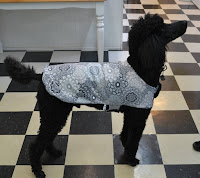Many people think that because their dog wears a fur coat all year, the dog must be good to go come the harsh winter weather. Unfortunately that is not always true.
Double coated dogs are fine without coats, such as huskies, malamutes, akitas, and German shepherds. These dogs evolved working outside in cold temperatures and their coats are an indicator of this. But single coated dogs benefit greatly from wearing a coat outside, such as greyhounds, boxers, pit bulls, cane corsos, etc.Jenny August at Fargo Fleece has been making dog
coats by hand here in Northeast Ohio for 10 years.
“The cold affects our pups the same way it does us,”
Jenny says. “Dogs come equipped with their own external layering system, but
some dogs have lighter layers of fur or smaller body mass than others and some
are not genetically suited to the environments they find themselves
transplanted in.”
Small dogs can be particularly susceptible to the cold due to a couple factors. They have less muscle mass which produces less heat. Small dogs also stand much closer to the ground and the closer proximity to the cold radiating outward from the surface saps their warmth faster. Since they’re also small, puppies face the same challenges in addition to the fact that puppies have higher water content which causes them to lose their heat faster. A breed that doesn't need a coat as an adult, like a golden retriever, would benefit from one as a puppy.
We are proud to carry hand made coats from Fargo Fleece and Terrier Wear. These coats are well made, machine washable and will last!






